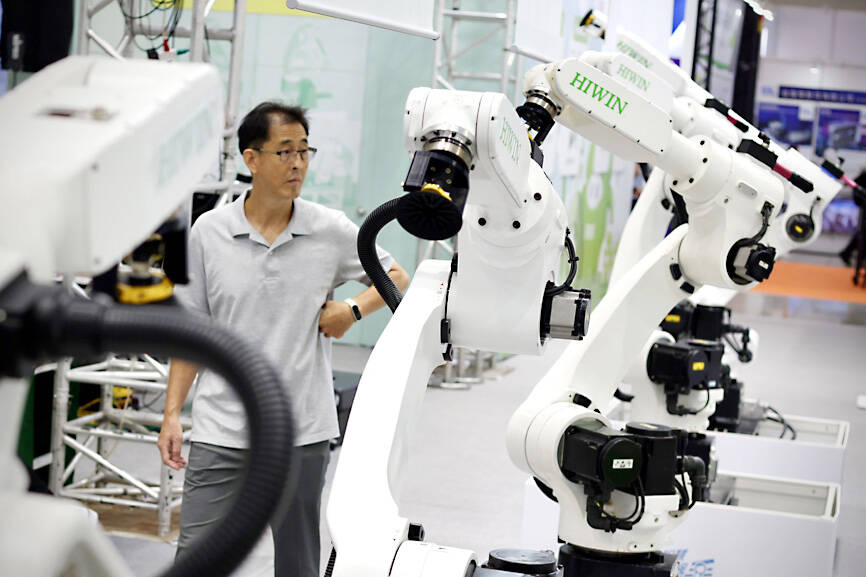Taiwanese manufacturers expect their businesses to improve in the next six months despite lingering uncertainty, as customer inventories have largely returned to healthy levels, the Chung-Hua Institution for Economic Research (CIER, 中華經濟研究院) said yesterday.
The Taipei-based think tank arrived at its findings after polling more than 500 firms about their operations, profit margin and factory utilization next year.
A total of 52.9 percent of the respondents said they had positive views for the first half of next year, higher than 48.5 percent for the second half of this year.

Photo: Ritchie B. Tongo, EPA-EFE
Scores above 50 suggest expansion, while lower values indicate contraction. The profit margin registered 42.3, falling for the fifth straight time.
“The industry is in the process of bottom building and would embark on a recovery,” CIER president Yeh Chun-hsien (葉俊顯) told an economic forum in Taipei.
The improvement would come even though end-market demand has not yet returned to a “green light” state, which signals steady growth, Yeh said, adding that the industry has shown an even recovery, helped by short and rush orders.
The local manufacturing industry is about to come out of the woods, as technology brands have started to rebuild inventories following several quarters of stock adjustments, he said.
A surge in demand for artificial intelligence applications and solutions would also benefit local firms in global supply chains, he said.
As a result, hiring activity is to increase, as 52.1 percent of the respondents said they had plans to raise headcounts, the institute said.
The global economy would show favorable turns next year after the US Federal Reserve recently indicated that its monetary tightening cycle is likely over, National Development Council Deputy Minister Kao Shien-quey (高仙桂) said.
Global trade is expected to expand by 3.5 percent next year as the IMF recently predicted, which is favorable for Taiwan’s exports, Kao said.
The local semiconductor is also betting on a recovery of double-percentage points, she said.
External demand and private consumption would play the role of growth driver next year, whereas consumer spending has single-handedly underpinned GDP growth this year, she said.
The 12-month outlook printed 60.4 percent, meaning a majority of firms hold positive views, the survey showed.
At the same time, companies outside of manufacturing would continue to thrive as firms and people resume gatherings and recreational activities, CIER said.
While robust business showings might continue into next year, service providers have to cope with persistent labor shortages and cost hikes, Yeh said.

SEEKING CLARITY: Washington should not adopt measures that create uncertainties for ‘existing semiconductor investments,’ TSMC said referring to its US$165 billion in the US Taiwan Semiconductor Manufacturing Co (TSMC, 台積電) told the US that any future tariffs on Taiwanese semiconductors could reduce demand for chips and derail its pledge to increase its investment in Arizona. “New import restrictions could jeopardize current US leadership in the competitive technology industry and create uncertainties for many committed semiconductor capital projects in the US, including TSMC Arizona’s significant investment plan in Phoenix,” the chipmaker wrote in a letter to the US Department of Commerce. TSMC issued the warning in response to a solicitation for comments by the department on a possible tariff on semiconductor imports by US President Donald Trump’s

The government has launched a three-pronged strategy to attract local and international talent, aiming to position Taiwan as a new global hub following Nvidia Corp’s announcement that it has chosen Taipei as the site of its Taiwan headquarters. Nvidia cofounder and CEO Jensen Huang (黃仁勳) on Monday last week announced during his keynote speech at the Computex trade show in Taipei that the Nvidia Constellation, the company’s planned Taiwan headquarters, would be located in the Beitou-Shilin Technology Park (北投士林科技園區) in Taipei. Huang’s decision to establish a base in Taiwan is “primarily due to Taiwan’s talent pool and its strength in the semiconductor

An earnings report from semiconductor giant and artificial intelligence (AI) bellwether Nvidia Corp takes center stage for Wall Street this week, as stocks hit a speed bump of worries over US federal deficits driving up Treasury yields. US equities pulled back last week after a torrid rally, as investors turned their attention to tax and spending legislation poised to swell the US government’s US$36 trillion in debt. Long-dated US Treasury yields rose amid the fiscal worries, with the 30-year yield topping 5 percent and hitting its highest level since late 2023. Stocks were dealt another blow on Friday when US President Donald

UNCERTAINTY: Investors remain worried that trade negotiations with Washington could go poorly, given Trump’s inconsistency on tariffs in his second term, experts said The consumer confidence index this month fell for a ninth consecutive month to its lowest level in 13 months, as global trade uncertainties and tariff risks cloud Taiwan’s economic outlook, a survey released yesterday by National Central University found. The biggest decline came from the timing for stock investments, which plunged 11.82 points to 26.82, underscoring bleak investor confidence, it said. “Although the TAIEX reclaimed the 21,000-point mark after the US and China agreed to bury the hatchet for 90 days, investors remain worried that the situation would turn sour later,” said Dachrahn Wu (吳大任), director of the university’s Research Center for